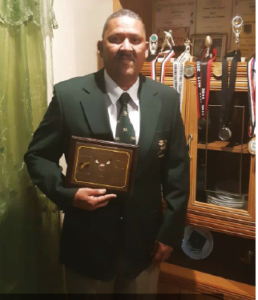In the 18th instalment of a series on black rugby legends, JOHN GOLIATH looks back at the career of former Boland and Saru flyhalf Silvin Isaacs.
Naas Botha was the poster boy of white rugby in South Africa in the 1980s. He was the king of the drop goal and he hardly missed a place kick. He was also a tactical genius and ran a game plan with an iron fist, while his ability to distribute and ghost past defenders were underrated parts of his game.
But while Botha adorned the back pages of the country’s newspapers for his metronomic boot, the heroics of Silvin Isaacs went largely unnoticed by those people who didn’t follow non-racial rugby in the ’80s and the early 90s.
Probably one of the saddest aspects of the non-racial South African Rugby Union (Saru) is that there aren’t any websites or many books you can peruse to find statistics of the fiercely contested SA Cup.
Isaacs, for example, doesn’t know how many games he ended up playing for his beloved Boland – ‘over 100’ was his answer during our sit-down – while in his nine-year provincial career he ‘probably scored over 1 000 points’.
But people don’t need statistics to remember Isaacs’ massive boot, and that he once kicked a 65m penalty in an SA Cup match against Tygerberg. The thousands of spectators who attended the SA Cup final between Boland and Western Province in 1988 will also remember him having a big hand in his team’s shock 9-6 victory at Athlone Stadium.
Isaacs was a prolific goal-kicker – some say even deadlier than Botha – a man who could slot kicks from any angle, anywhere on the field. He was Boland captain Francois ‘Kabalie’ Davids’ go-to man during those days, and Isaacs didn’t want to let his mentor or the fans down by missing crucial kicks.
‘When I came home from school, we played with plastic milk bottles. We filled them up with grass and kicked them around,’ says Isaacs from his home in Wellington.

‘I just wanted to kick. When I played for Boland I used to go to the field with five balls and a couple of kids and I practised my kicking. Being a flyhalf is important, because you have to get the points. Everyone expects that from you.
‘Being able to kick goals is something you are born with, but you also need to put in the work. You can’t teach players to kick, but you can help them improve.’
In that 1988 final against WP, Isaacs went up against Fagmie Solomons, probably the greatest No 10 in the history of Saru rugby. But he overshadowed the great Solomons on that day, and a lot of people remember his big, relieving kicks that helped Boland protect their slender lead in a tight game. Isaacs also kicked a penalty and conversion to contribute five of his team’s nine points.
‘Fagmie was one of the great players I played against and that was my motivation to perform,’ says Isaacs.
Before that 1988 season, Boland were not seen as serious contenders for the SA Cup. They were renowned for playing attractive running rugby, but never managed to win the trophy. However, when legendary Saru coach Cupido Cupido took over the reins in 1984, he went about building a team that could compete with the best players non-racial rugby in South Africa had to offer.
‘Boland were in shambles four years before that SA Cup win,’ says Isaacs. ‘The teams were never settled, and they probably used over 150 players in the space of a couple of years. Then they appointed Cupido as head coach and for four years he built a team that became a unit.’
Boland camped at a hotel in Paarl for three days ahead of the SA Cup final. However, they had a lot of trouble on the morning of the match.
Buses that broke down were a big issue for the non-racial teams during apartheid, and unfortunately for Boland it almost derailed the biggest day in the history of the union. But, for some reason, the drama was a good distraction before facing a WP team who loved to bully and intimidate their opponents.
‘I will never forget that day,’ says Isaacs. ‘On our way to Athlone Stadium we got stuck on the N1. Our bus broke down before Kraaifontein about two hours before the game was scheduled to kick off, and we had to wait for two taxis from Wellington to take us to the game.
‘We got to the game 15 minutes before kick-off. The stadium was already packed. We couldn’t even warm up and went straight to the changing room.
‘I found the biggest touch of my life when we were under pressure in that game. I kicked the ball from our own goalline to their 5m line! Everybody played their part in the win.

‘It was the best moment in our rugby careers. Boland had never won the SA Cup before that. I got many awards that year, which still makes me very proud.’
Isaacs may not have been imprinted on posters, but he definitely still resides in the heart of the Boland faithful.
– This article first appeared in the August 2018 issue of SA Rugby magazine





